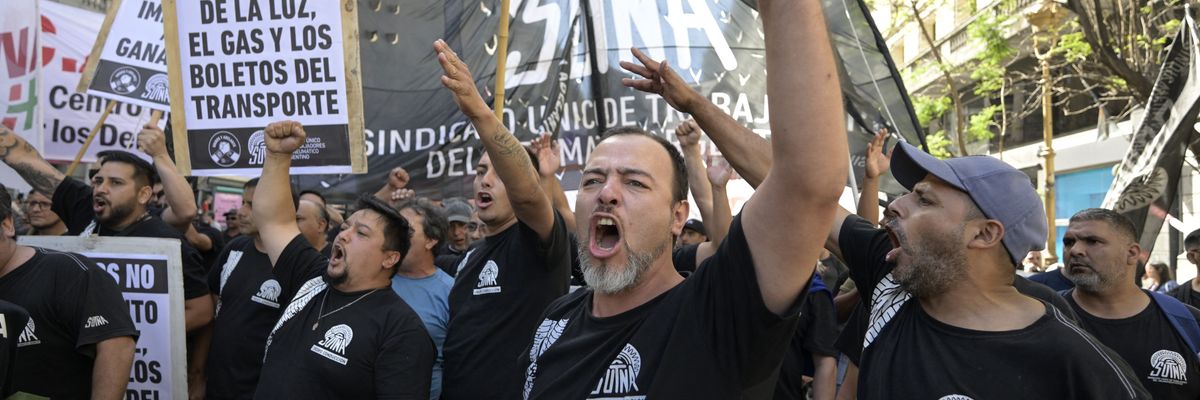
Members of the Argentinian Tire Workers' Union and other protesters demonstrate against the new government of Javier Milei in Buenos Aires, on December 20, 2023, carrying signs that read, "We say no to the increase in electricity, gas, and transport tickets."
Argentinians Defy Milei's Crackdown With Mass Protests Against Austerity
"This country's problem is not protests," said one demonstrator. "The country's problem is that Milei took away 50% of our purchasing power overnight with a devaluation."
Days after Argentinian President Javier Milei's security minister announced that law enforcement would crack down on anyone who organizes or participates in protests that block roads, thousands of residents risked arrest and cuts to their social benefit payments by taking to the streets Wednesday night and into Thursday morning, rallying against Milei's latest package of austerity measures.
Buenos Aires residents responded to Milei's announcement of new anti-worker economic decrees on Wednesday by banging pots and pans on their balconies before congregating on streets across the capital and marching to the National Congress.
Protesters chanted, "Milei! You're garbage! You are the dictatorship!" and carried signs reading, "We say no to the increase in electricity, gas, and transport tickets"—a reference to measures the right-wing president unveiled earlier this month when he announced the devaluation of the peso by 50% and cuts to public spending and energy and transportation subsidies.
The measure announced Wednesday will further intensify Milei's austerity approach in a country where about 40% of residents live in poverty.
Milei's decree will pave the way for state-owned companies to be privatized, mining to be deregulated, firms to strip workers of rights including maternity leave, and foreign companies to invest in rental housing and land.
Critics including former presidential candidate Myriam Bregman of the progressive Workers' Left Front accused Milei of violating the Argentinian Constitution by bypassing Congress to introduce the new measures.
"There are so many illegalities here I don't know where to start," Bregman told The Guardian, saying the president had released a "battle plan against working people."
Hector Daer, secretary of the General Confederation of Labor, told Telesur English that Milei's announcement "subverts the democratic republican order and disrupts the division of powers."
"His unconstitutionality is evident," Daer said. "We will not tolerate an attack on social security and labor and social rights."
Protesters also took to the streets before Milei's announcement Wednesday, honoring the victims of the violent repression of former President Fernando de la Rúa's administration, which cracked down on mass protests on December 20, 2001. Nearly 40 people were killed in the clashes more than two decades ago and almost 500 were injured.
The protests on Wednesday were met with a show of force by police in riot gear, but El País reported that the mobilization proved too large for security forces to quell it.
Picketing—blocking streets and highways—is "one of Argentina's most common forms of protest," according to the newspaper, and too many demonstrators turned out to limit the protest to only sidewalks. El País reported that people rallied in city streets without blocking "main traffic arteries" and that only two arrests were made.
Protesters said Milei's administration is more concerned with pressuring people out of protesting than responding to the concerns of citizens who fear losing their pensions and jobs as a result of the austerity measures.
"This country's problem is not protests," Betina Sanchís, a retiree, told El País. "The country's problem is that Milei took away 50% of our purchasing power overnight with a devaluation."
An Urgent Message From Our Co-Founder
Dear Common Dreams reader, The U.S. is on a fast track to authoritarianism like nothing I've ever seen. Meanwhile, corporate news outlets are utterly capitulating to Trump, twisting their coverage to avoid drawing his ire while lining up to stuff cash in his pockets. That's why I believe that Common Dreams is doing the best and most consequential reporting that we've ever done. Our small but mighty team is a progressive reporting powerhouse, covering the news every day that the corporate media never will. Our mission has always been simple: To inform. To inspire. And to ignite change for the common good. Now here's the key piece that I want all our readers to understand: None of this would be possible without your financial support. That's not just some fundraising cliche. It's the absolute and literal truth. We don't accept corporate advertising and never will. We don't have a paywall because we don't think people should be blocked from critical news based on their ability to pay. Everything we do is funded by the donations of readers like you. Will you donate now to help power the nonprofit, independent reporting of Common Dreams? Thank you for being a vital member of our community. Together, we can keep independent journalism alive when it’s needed most. - Craig Brown, Co-founder |
Days after Argentinian President Javier Milei's security minister announced that law enforcement would crack down on anyone who organizes or participates in protests that block roads, thousands of residents risked arrest and cuts to their social benefit payments by taking to the streets Wednesday night and into Thursday morning, rallying against Milei's latest package of austerity measures.
Buenos Aires residents responded to Milei's announcement of new anti-worker economic decrees on Wednesday by banging pots and pans on their balconies before congregating on streets across the capital and marching to the National Congress.
Protesters chanted, "Milei! You're garbage! You are the dictatorship!" and carried signs reading, "We say no to the increase in electricity, gas, and transport tickets"—a reference to measures the right-wing president unveiled earlier this month when he announced the devaluation of the peso by 50% and cuts to public spending and energy and transportation subsidies.
The measure announced Wednesday will further intensify Milei's austerity approach in a country where about 40% of residents live in poverty.
Milei's decree will pave the way for state-owned companies to be privatized, mining to be deregulated, firms to strip workers of rights including maternity leave, and foreign companies to invest in rental housing and land.
Critics including former presidential candidate Myriam Bregman of the progressive Workers' Left Front accused Milei of violating the Argentinian Constitution by bypassing Congress to introduce the new measures.
"There are so many illegalities here I don't know where to start," Bregman told The Guardian, saying the president had released a "battle plan against working people."
Hector Daer, secretary of the General Confederation of Labor, told Telesur English that Milei's announcement "subverts the democratic republican order and disrupts the division of powers."
"His unconstitutionality is evident," Daer said. "We will not tolerate an attack on social security and labor and social rights."
Protesters also took to the streets before Milei's announcement Wednesday, honoring the victims of the violent repression of former President Fernando de la Rúa's administration, which cracked down on mass protests on December 20, 2001. Nearly 40 people were killed in the clashes more than two decades ago and almost 500 were injured.
The protests on Wednesday were met with a show of force by police in riot gear, but El País reported that the mobilization proved too large for security forces to quell it.
Picketing—blocking streets and highways—is "one of Argentina's most common forms of protest," according to the newspaper, and too many demonstrators turned out to limit the protest to only sidewalks. El País reported that people rallied in city streets without blocking "main traffic arteries" and that only two arrests were made.
Protesters said Milei's administration is more concerned with pressuring people out of protesting than responding to the concerns of citizens who fear losing their pensions and jobs as a result of the austerity measures.
"This country's problem is not protests," Betina Sanchís, a retiree, told El País. "The country's problem is that Milei took away 50% of our purchasing power overnight with a devaluation."
- Argentine Unions Lead Mass Demonstrations for Higher Wages, Lower Prices ›
- Milei Couples 'Total Crackdown' on Protest With Economic Shocks in Argentina ›
- Unions Lead Protests Against Milei's Anti-Worker Decree in Argentina ›
- Argentine Unions Lead General Strike Against Milei's Neoliberal Blitz ›
- 'Argentina Stopped': Unions Hold Second General Strike Over Milei Austerity | Common Dreams ›
- Trump Admin Responds to Milei’s Failed Libertarian Policies With a US Taxpayer Bailout for Argentina | Common Dreams ›
Days after Argentinian President Javier Milei's security minister announced that law enforcement would crack down on anyone who organizes or participates in protests that block roads, thousands of residents risked arrest and cuts to their social benefit payments by taking to the streets Wednesday night and into Thursday morning, rallying against Milei's latest package of austerity measures.
Buenos Aires residents responded to Milei's announcement of new anti-worker economic decrees on Wednesday by banging pots and pans on their balconies before congregating on streets across the capital and marching to the National Congress.
Protesters chanted, "Milei! You're garbage! You are the dictatorship!" and carried signs reading, "We say no to the increase in electricity, gas, and transport tickets"—a reference to measures the right-wing president unveiled earlier this month when he announced the devaluation of the peso by 50% and cuts to public spending and energy and transportation subsidies.
The measure announced Wednesday will further intensify Milei's austerity approach in a country where about 40% of residents live in poverty.
Milei's decree will pave the way for state-owned companies to be privatized, mining to be deregulated, firms to strip workers of rights including maternity leave, and foreign companies to invest in rental housing and land.
Critics including former presidential candidate Myriam Bregman of the progressive Workers' Left Front accused Milei of violating the Argentinian Constitution by bypassing Congress to introduce the new measures.
"There are so many illegalities here I don't know where to start," Bregman told The Guardian, saying the president had released a "battle plan against working people."
Hector Daer, secretary of the General Confederation of Labor, told Telesur English that Milei's announcement "subverts the democratic republican order and disrupts the division of powers."
"His unconstitutionality is evident," Daer said. "We will not tolerate an attack on social security and labor and social rights."
Protesters also took to the streets before Milei's announcement Wednesday, honoring the victims of the violent repression of former President Fernando de la Rúa's administration, which cracked down on mass protests on December 20, 2001. Nearly 40 people were killed in the clashes more than two decades ago and almost 500 were injured.
The protests on Wednesday were met with a show of force by police in riot gear, but El País reported that the mobilization proved too large for security forces to quell it.
Picketing—blocking streets and highways—is "one of Argentina's most common forms of protest," according to the newspaper, and too many demonstrators turned out to limit the protest to only sidewalks. El País reported that people rallied in city streets without blocking "main traffic arteries" and that only two arrests were made.
Protesters said Milei's administration is more concerned with pressuring people out of protesting than responding to the concerns of citizens who fear losing their pensions and jobs as a result of the austerity measures.
"This country's problem is not protests," Betina Sanchís, a retiree, told El País. "The country's problem is that Milei took away 50% of our purchasing power overnight with a devaluation."
- Argentine Unions Lead Mass Demonstrations for Higher Wages, Lower Prices ›
- Milei Couples 'Total Crackdown' on Protest With Economic Shocks in Argentina ›
- Unions Lead Protests Against Milei's Anti-Worker Decree in Argentina ›
- Argentine Unions Lead General Strike Against Milei's Neoliberal Blitz ›
- 'Argentina Stopped': Unions Hold Second General Strike Over Milei Austerity | Common Dreams ›
- Trump Admin Responds to Milei’s Failed Libertarian Policies With a US Taxpayer Bailout for Argentina | Common Dreams ›

